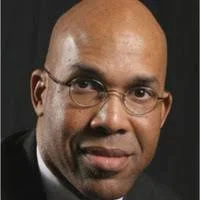Allen Dwight Callahan: The Bible Told Him So
Kanye West, Jesus Walks 2005 Grammy Performance
Remember Kanye West? Before Kim Kardashian? Before the death of Donda West, his beloved mother? Before the untreated ravages of mental illness that swung him far right in the direction of MAGA and Donald Trump and bizarre eruptions of antisemitism - (There’s a lesson in that)? Well, I can hardly watch Kanye these days. I prefer to think back twenty years, to his electric performance of Jesus Walks at the 2005 Grammy Awards ceremony – the most incredible production of an evening of unforgettable productions: The Black women in a kaleidoscope of church dresses; the acrobatic men in shirtsleeves; the frenzied chants and rhythmic gyrations and, finally, West himself, ascending above the excited crowd like a newly resurrected Christ.
The scene possessed all the spiritual ado of the ecstatic church meeting, although, according to Allen Dwight Callahan, a professor of New Testament studies in Bahia, Brazil, religion was only the half of it:
"In hip hop, Jesus emerges as a perfect figure available to young people," Callahan says. "In Still I Rise, Tupac Shakur makes the point that nobody owns Jesus, and KRS-One calls Jesus one of the greatest revolutionaries. There are biblical figures on the loose and people can draw on them directly. They don't need the intercession of the preacher."
The persistence of Jesus is just one of the topics Callahan covers in The Talking Book: African Americans and the Bible, his exploration of the influence of the Bible across a vast spectrum of Black American life. He examines the recurrence of four Biblical themes - Exile, Exodus, Ethiopia (Africa) and Emmanuel (Jesus) - tracing their influence from slavery to civil rights, and spirituals to gangsta rap, and providing, along the way, a rich, idiosyncratic retelling of the African American story.
"The Bible's images reverberate in every aspect of African American culture - in music, plastic art, textiles and literature, of course. One of the things I try to come to terms with is How is it that this book is all over the place?"
"Where there is no vision, the people perish," says Callahan, citing the verse in Proverbs that largely answers his question. The Bible comprises a library of characters, images and stories that have given Blacks a means of apprehending and ultimately transcending the horror of slavery and its debilitating aftermath. The title The Talking Book comes from a trope developed by critic Henry Louis Gates, Jr. and refers to a belief of early African Americans that the Bible could talk. Watching their masters read aloud, slaves imagined them to be in conversation with the printed page. Which for Callahan calls to mind the phrase, "The Bible tells me so."
"Of course, books don't talk," says Callahan, who is also a Baptist minister. "That's just our roundabout way of saying we're appealing to Biblical authority. When I preach from the Bible, I am actually going in and taking something out and serving it up to the congregation. I'm giving my particular interpretation."
Likewise, the children of slavery, as Callahan calls African- Americans, had their own interpretation of the Bible, one that often differed dramatically from that of their masters' - that all men and women are equal in the eyes of God and that God helps the weak defeat the strong.
"The Bible became a luxuriant resource for Black people," says Callahan, "and they plied it for all it was worth."
The book of Exodus in which God asks Moses to lead the Hebrews out of slavery in Egypt was a particular favourite. In it, God gives Moses magical powers to intimidate the Pharaoh into letting his people go. Callahan says the slaves related strongly to a story in which "God puts a beat-down on Pharaoh."
Slaves also connected with Moses because of his magical powers. They identified him with the conjurors of West African religion (Hoodoo).
And they revered his gift of leadership. Harriet Tubman, the fugitive slave, was nicknamed Moses for her courage in guiding escaped slaves to Canada. Civil rights activist Martin Luther King, Jr. saw himself as a kind of Moses, leading African Americans out of racial oppression and into a world of equal citizenship - though King suspected that, like Moses, he might not live to see his goal.
"We've got some difficult days ahead, but it doesn't matter with me now. Because I've seen the mountaintop. And I don't mind. Like anybody, I would like to live a long life. Longevity has its place. But I'm not concerned about that now. I just want to do God's will. And He's allowed me to go up to the mountain. And I've looked over. And I've seen the Promised Land," preached Martin King the night before he was shot to death on a balcony in Memphis, Tennessee.
Callahan's ideas about Black Americans and the Bible begin with a kind of Big Bang theory, in which the spiritual needs of slaves collided with the evangelical religion that emerged in the 18th century. The so-called Great Awakening's messengers were the itinerant preachers travelling across the country sermonizing on street corners or in town squares - in any open space they might find.
"I'm trying to put an interpretive frame on a very complex moment," says Callahan. "I'm not positing a causal relationship. You've got the transatlantic slave trade becoming the basis for a political economy in the Atlantic world and then you've got this religious revivalism hitting colonial America. In some respects, it was a major religious-cultural-social event. There were some phenomenal preachers whose listeners would cry, fall down, foam at the mouth. The cultural impact was something like The Beatles.
"Most important, it was a place where people of all social registers came together. The message was the same for everyone the prince, the pauper, the slave, the master, the man, the woman, the Black, the white 'Without salvation you would perish.'"
The content, and its style of delivery, captured the imagination of slaves. By the end of the 18th century, many had been evangelized and some had become preachers. Evangelists believed that every individual should have access to God through the unmediated Bible. They challenged laws prohibiting the education of slaves, opening Sabbath schools, and teaching converted slaves how to read.
Bible literacy, however, had some unintended consequences The three major slave rebellions of the 19th century were organized by literate African Americans involved in religious instruction. The last, Nat Turner's Rebellion, which took place in Virginia in 1831, resulted in the deaths of 55 whites and nearly 200 blacks.
"After Nat Turner, the master class had had it," says Callahan. "There was legislation enacted all over the place. (They) said, 'We don't want more than five Blacks congregating at a time. We don't want black preachers and we don't want anybody teaching slaves to read the Bible.' They identified religious instruction with a whole lot of trouble. The link between Bible literacy and slave insurgency was clear."
Callahan's take on the Bible is liberating and empowering for African Americans. But not everybody sees it his way. "Slaves, obey your masters" (Ephesians 6 5) is just one of the verses Black folks love to hate.
"Sure, there's slavery in the Bible, and slavery is sanctioned," says Callahan. "Certainly, there are a number of very unsavoury things you can find in there. But there is a lot of good stuff, too. Some of the most sublime expressions that I know of are in the Bible, like God is love."
Callahan grew up in Pennsylvania with his mother, sister and grandfather, and attended the African Methodist Episcopal church. He is married with four grown children. He has a B.A. in Religion from Princeton and advanced degrees from Harvard in the study of religion, specializing in the New Testament and the history and literature of early Christians.
He started thinking about the specific relationship between African Americans and the Bible during his university studies. "I knew that my people had been dealing with this book for a long time. But where were their interpretations? I wondered if there was a body of interpretations like that of the Church Fathers.
"The short answer was yes and no. There were no bound volumes, but certain kinds of elaborations were all over the place. I would listen to songs and try to decode the messages I was hearing. Once I got into this project, African American literature - for instance the writing of James Baldwin - began to really resonate.
Tupac Shakur (photo by Dana Lixenberg)
"At the same time," says Callahan, "my kids were becoming teenagers. My daughter directs the church choir and plays piano, and my guys all rap."
Callahan was surprised by the preponderance of biblical references he heard in urban music. He had expected his research to begin in the 19th century and conclude some time in the 20th.
"But my kids showed me that I was completely wrong. There are whole schools dedicated to parsing biblical images in hip hop," he says.
"The Bible is just as important today as it's always been.”
A previous version of this piece appeared in the Toronto Star.








